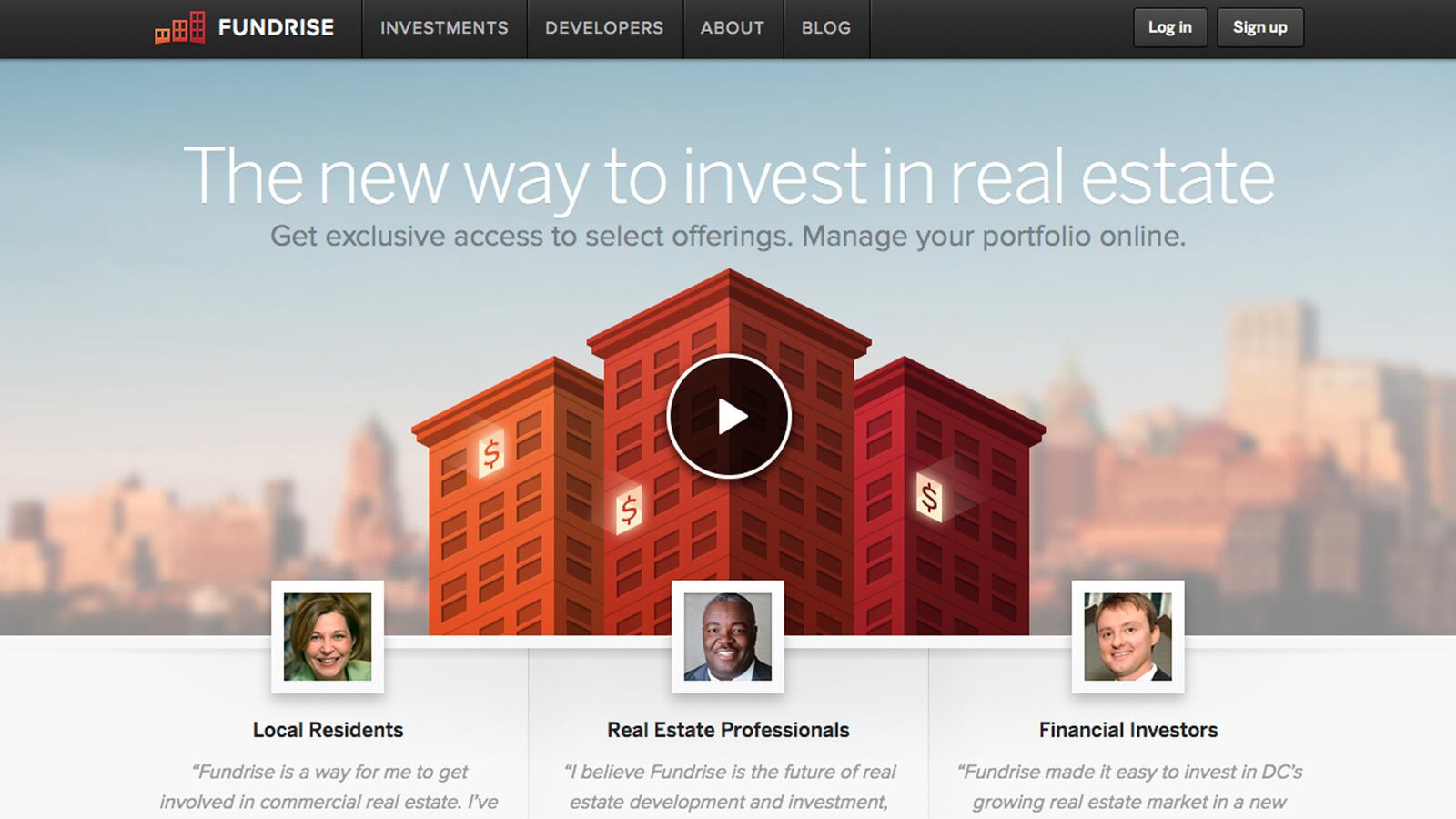Crowdfunding has taken off. Watch designers, moviemakers, and cause crusaders all can use the exploding fundraising technique to solicit donations from everyday people to help finance their ideas. Usually a backer donates money to a proposal and in return gets a T-shirt or a sample of the product once it’s finished. But recently there’s been a push to grow crowdfunding even bigger and apply it to finding people who won’t just donate to an idea, but invest in it. Like solar panels.
Or real estate.

Fundrise utilizes the crowdfunding techniques seen on websites like Kickstarter to draw attention to its real estate projects in Washington, D.C.
Ben Miller and his younger brother Dan started the company after they were attempting to find backers for development deals in the city’s up-and-coming H Street area and couldn’t draw enough interest from traditional investors and banks. “We were buying real estate in H Street North East, which is the Brooklyn of D.C., and financial institutions were saying, ‘We’re not really sure where that is,’” Ben explains. “That disconnect to me was striking, so I said, I’m going to try to raise money from people instead.”
It took about two years for the Millers’ idea to become a reality. First the two brothers had to find out if what they wanted to do was legal—and it was no small feat. “To make that possible we had to build this whole technology platform. We had to go get regulators to clear what we were doing, because no one had done that before,” Ben says. “Finding somebody who was an expert and knew the regulations—that took me months.”
The Millers ultimately found a relatively unused SEC exemption called Regulation A that would allow them to reach out to unaccredited investors in the community to invest in their first crowdfunded project. Once the regulations were cleared, they then had to hope that there was enough interest in the scheme—converting an empty building into a combination Asian retail market and restaurant.
“The first [project] took three months to raise the $325,000, which to me was frustratingly slow. No one had heard of us. It was a novel concept,” Ben Miller says. “People were saying, I’m buying a share of this building online? It’s different. No one’s ever done it, so it took three months to raise money for the first time.” The second project—for a redevelopment property in the Shaw neighborhood—raised $250,000 in a week among just 14 investors.
Investors in a Fundrise site will get partial ownership of the building, as well as a percent of the total income from the tenant and a portion of the rent. In the case of the Miller brother’s first property, all investors get a proportionate percentage of the income from the annual $150,000 rent, as well as a portion of the 30 percent of the tenant’s profit that the tenant must pay back to the Fundrise LLC.
The first project, which launched in August 2012, is under construction and is expected to open October 1. Fundrise has crowdfunded six additional projects and is now hosting ventures from other real estate companies. The majority are in the H Street neighborhood with a few other investments in other gentrifying areas around D.C.
Two locations are currently open for investments, one of which is only asking for people to demonstrate their interest in potentially investing in an apartment complex located north of the bustling, hip U Street neighborhood. Fundrise is in a bidding war with other companies to purchase the space from the city and has asked for backers to help raise $300,000 in potential investments.
With three days left, Fundrise has received more than $950,000 in pledges.
But not everyone can do what the Miller brothers have been able to. The loophole they found explicitly works only for local investors or people who are arguably putting money into a product (or building) they themselves hope to utilize. And it takes massive amounts of time to get each project passed by the Securities and Exchange Commission before they get a green light.
“Banks are the gatekeepers. For too long they have made the final decisions of what gets funded and what doesn’t,” says Ruth Hedges, the creator and producer of the annual Crowdfunding Convention and Roadmap. “It’s really harmed communities and progress and job creation and innovation.”
But that could all soon change thanks to the passage of the JOBS Act. Passed in April of last year, it has a measure that would reduce the restrictions on crowdfunding and allow companies and individuals to more easily court investors. Crowdfunding enthusiasts like Hedges hope the act will make it easier for individuals to get involved with companies and new ideas. “Look at Instagram. It was sold for a billion dollars 560 days after it launched. If Instagram would have been crowdfunded, every one of those initial investors would have been very wealthy,” she said. “But the average American has never had access to these types of deals.”
Although the JOBS Act passed, the SEC is more than a half a year behind on releasing the crowdfunding guidelines that would thus allow all people to start using the technique to find investors. The guidelines are important because they will standardize the way companies can request crowdfunding online and are expected to mandate that companies provide some proof that their ideas are viable.
But until those guidelines are released, experts are wary of the repercussions future investors might face.
“The type of typical [person looking for investment] is a person that has a dream. And while other investors might buy into it, that’s where there’s greater risk for people to get taken,” explains Peter Chinloy, a professor of finance and real estate at American University’s Kogod School of Business. “Because there isn’t any revenue, there isn’t any proof that that idea exists.” In addition, Chinloy warns that the investments would essentially be permanent so that people eager to get involved with a new idea should know what they are getting into and demand a higher payoff.
“There is much greater risk than buying shares in a publically traded company that is already listed,” he said. “These are companies not listed anywhere. Their illiquidity should show that people should demand some proof in the sense of a higher return.”






